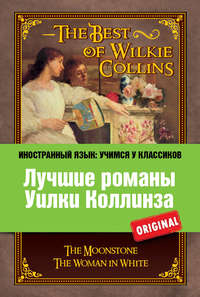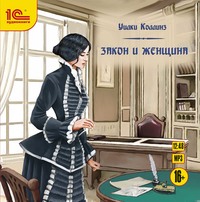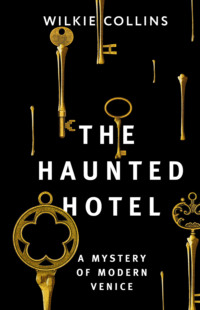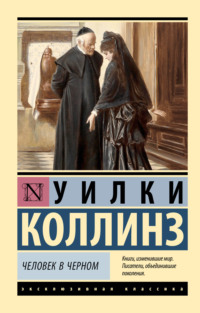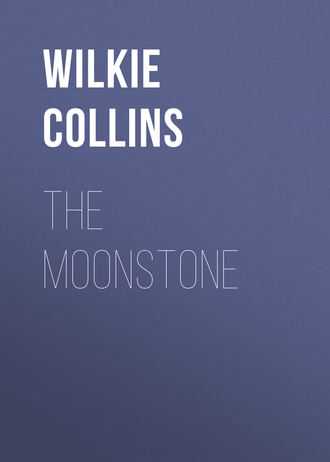
Полная версия
The Moonstone
Mr. Superintendent next asked to see Miss Rachel herself. Penelope mentioned his request through the door. The answer reached us by the same road: âI have nothing to tell the policemanâI canât see anybody.â Our experienced officer looked equally surprised and offended when he heard that reply. I told him my young lady was ill, and begged him to wait a little and see her later. We thereupon went downstairs again, and were met by Mr. Godfrey and Mr. Franklin crossing the hall.
The two gentlemen, being inmates of the house, were summoned to say if they could throw any light on the matter. Neither of them knew anything about it. Had they heard any suspicious noises during the previous night? They had heard nothing but the pattering of the rain. Had I, lying awake longer than either of them, heard nothing either? Nothing! Released from examination, Mr. Franklin, still sticking to the helpless view of our difficulty, whispered to me: âThat man will be of no earthly use to us. Superintendent Seegrave is an ass.â Released in his turn, Mr. Godfrey whispered to meââEvidently a most competent person. Betteredge, I have the greatest faith in him!â Many men, many opinions, as one of the ancients said, before my time.
Mr. Superintendentâs next proceeding took him back to the âboudoirâ again, with my daughter and me at his heels. His object was to discover whether any of the furniture had been moved, during the night, out of its customary placeâhis previous investigation in the room having, apparently, not gone quite far enough to satisfy his mind on this point.
While we were still poking about among the chairs and tables, the door of the bedroom was suddenly opened. After having denied herself to everybody, Miss Rachel, to our astonishment, walked into the midst of us of her own accord. She took up her garden hat from a chair, and then went straight to Penelope with this question:
âMr. Franklin Blake sent you with a message to me this morning?â
âYes, miss.â
âHe wished to speak to me, didnât he?â
âYes, miss.â
âWhere is he now?â
Hearing voices on the terrace below, I looked out of the window, and saw the two gentlemen walking up and down together. Answering for my daughter, I said, âMr. Franklin is on the terrace, miss.â
Without another word, without heeding Mr. Superintendent, who tried to speak to her, pale as death, and wrapped up strangely in her own thoughts, she left the room, and went down to her cousins on the terrace.
It showed a want of due respect, it showed a breach of good manners, on my part, but, for the life of me, I couldnât help looking out of the window when Miss Rachel met the gentlemen outside. She went up to Mr. Franklin without appearing to notice Mr. Godfrey, who thereupon drew back and left them by themselves. What she said to Mr. Franklin appeared to be spoken vehemently. It lasted but for a short time, and, judging by what I saw of his face from the window, seemed to astonish him beyond all power of expression. While they were still together, my lady appeared on the terrace. Miss Rachel saw herâsaid a few last words to Mr. Franklinâand suddenly went back into the house again, before her mother came up with her. My lady, surprised herself, and noticing Mr. Franklinâs surprise, spoke to him. Mr. Godfrey joined them, and spoke also. Mr. Franklin walked away a little, between the two, telling them what had happened I suppose, for they both stopped short, after taking a few steps, like persons struck with amazement. I had just seen as much as this, when the door of the sitting-room was opened violently. Miss Rachel walked swiftly through to her bedroom, wild and angry, with fierce eyes and flaming cheeks. Mr. Superintendent once more attempted to question her. She turned round on him at her bedroom door. âI have not sent for you!â she cried out vehemently. âI donât want you. My Diamond is lost. Neither you nor anybody else will ever find it!â With those words she went in, and locked the door in our faces. Penelope, standing nearest to it, heard her burst out crying the moment she was alone again.
In a rage, one moment; in tears, the next! What did it mean?
I told the Superintendent it meant that Miss Rachelâs temper was upset by the loss of her jewel. Being anxious for the honour of the family, it distressed me to see my young lady forget herselfâeven with a police-officerâand I made the best excuse I could accordingly. In my own private mind, I was more puzzled by Miss Rachelâs extraordinary language and conduct than words can tell. Taking what she had said at her bedroom door as a guide to guess by, I could only conclude that she was mortally offended by our sending for the police, and that Mr. Franklinâs astonishment on the terrace was caused by her having expressed herself to him (as the person chiefly instrumental in fetching the police) to that effect. If this guess was right, whyâhaving lost her Diamondâshould she object to the presence in the house of the very people whose business it was to recover it for her? And how, in Heavenâs name, could she know that the Moonstone would never be found again?
As things stood, at present, no answer to those questions was to be hoped for from anybody in the house. Mr. Franklin appeared to think it a point of honour to forbear repeating to a servantâeven to so old a servant as I wasâwhat Miss Rachel had said to him on the terrace. Mr. Godfrey, who, as a gentleman and a relative, had been probably admitted into Mr. Franklinâs confidence, respected that confidence as he was bound to do. My lady, who was also in the secret no doubt, and who alone had access to Miss Rachel, owned openly that she could make nothing of her. âYou madden me when you talk of the Diamond!â All her motherâs influence failed to extract from her a word more than that.
Here we were, then, at a deadlock about Miss Rachelâand at a deadlock about the Moonstone. In the first case, my lady was powerless to help us. In the second (as you shall presently judge), Mr. Seegrave was fast approaching the condition of a superintendent at his witsâ end.
Having ferreted about all over the âboudoir,â without making any discoveries among the furniture, our experienced officer applied to me to know, whether the servants in general were or were not acquainted with the place in which the Diamond had been put for the night.
âI knew where it was put, sir,â I said, âto begin with. Samuel, the footman, knew alsoâfor he was present in the hall, when they were talking about where the Diamond was to be kept that night. My daughter knew, as she has already told you. She or Samuel may have mentioned the thing to the other servantsâor the other servants may have heard the talk for themselves, through the side-door of the hall, which might have been open to the back staircase. For all I can tell, everybody in the house may have known where the jewel was, last night.â
My answer presenting rather a wide field for Mr. Superintendentâs suspicions to range over, he tried to narrow it by asking about the servantsâ characters next.
I thought directly of Rosanna Spearman. But it was neither my place nor my wish to direct suspicion against a poor girl, whose honesty had been above all doubt as long as I had known her. The matron of the Reformatory had reported her to my lady as a sincerely penitent and thoroughly trustworthy girl. It was the Superintendentâs business to discover reason for suspecting her firstâand then, and not till then, it would be my duty to tell him how she came into my ladyâs service. âAll our people have excellent characters,â I said. âAnd all have deserved the trust their mistress has placed in them.â After that, there was but one thing left for Mr. Seegrave to doânamely, to set to work, and tackle the servantsâ characters himself.
One after another, they were examined. One after another, they proved to have nothing to sayâand said it (so far as the women were concerned) at great length, and with a very angry sense of the embargo laid on their bedrooms. The rest of them being sent back to their places downstairs, Penelope was then summoned, and examined separately a second time.
My daughterâs little outbreak of temper in the âboudoir,â and her readiness to think herself suspected, appeared to have produced an unfavourable impression on Superintendent Seegrave. It seemed also to dwell a little on his mind, that she had been the last person who saw the Diamond at night. When the second questioning was over, my girl came back to me in a frenzy. There was no doubt of it any longerâthe police-officer had almost as good as told her she was the thief! I could scarcely believe him (taking Mr. Franklinâs view) to be quite such an ass as that. But, though he said nothing, the eye with which he looked at my daughter was not a very pleasant eye to see. I laughed it off with poor Penelope, as something too ridiculous to be treated seriouslyâwhich it certainly was. Secretly, I am afraid I was foolish enough to be angry too. It was a little tryingâit was, indeed. My girl sat down in a corner, with her apron over her head, quite broken-hearted. Foolish of her, you will say: she might have waited till he openly accused her. Well, being a man of just and equal temper, I admit that. Still Mr. Superintendent might have rememberedânever mind what he might have remembered. The devil take him!
The next and last step in the investigation brought matters, as they say, to a crisis. The officer had an interview (at which I was present) with my lady. After informing her that the Diamond must have been taken by somebody in the house, he requested permission for himself and his men to search the servantsâ rooms and boxes on the spot. My good mistress, like the generous highbred she was, refused to let us be treated like thieves. âI will never consent to make such a return as that,â she said, âfor all I owe to the faithful servants who are employed in my house.â
Mr. Superintendent made his bow, with a look in my direction, which said plainly, âWhy employ me, if you are to tie my hands in this way?â As head of the servants, I felt directly that we were bound, in justice to all parties, not to profit by our mistressâs generosity. âWe gratefully thank your ladyship,â I said; âbut we ask permission to do what is right in this matter, by giving up our keys. When Gabriel Betteredge sets the example,â says I, stopping Superintendent Seegrave at the door, âthe rest of the servants will follow, I promise you. There are my keys, to begin with!â My lady took me by the hand, and thanked me with the tears in her eyes. Lord! what would I not have given, at that moment, for the privilege of knocking Superintendent Seegrave down!
As I had promised for them, the other servants followed my lead, sorely against the grain, of course, but all taking the view that I took. The women were a sight to see, while the police-officers were rummaging among their things. The cook looked as if she could grill Mr. Superintendent alive on a furnace, and the other women looked as if they could eat him when he was done.
The search over, and no Diamond or sign of a Diamond being found, of course, anywhere, Superintendent Seegrave retired to my little room to consider with himself what he was to do next. He and his men had now been hours in the house, and had not advanced us one inch towards a discovery of how the Moonstone had been taken, or of whom we were to suspect as the thief.
While the police-officer was still pondering in solitude, I was sent for to see Mr. Franklin in the library. To my unutterable astonishment, just as my hand was on the door, it was suddenly opened from the inside, and out walked Rosanna Spearman!
After the library had been swept and cleaned in the morning, neither first nor second housemaid had any business in that room at any later period of the day. I stopped Rosanna Spearman, and charged her with a breach of domestic discipline on the spot.
âWhat might you want in the library at this time of day?â I inquired.
âMr. Franklin Blake dropped one of his rings upstairs,â says Rosanna; âand I have been into the library to give it to him.â The girlâs face was all in a flush as she made me that answer; and she walked away with a toss of her head and a look of self-importance which I was quite at a loss to account for. The proceedings in the house had doubtless upset all the women-servants more or less; but none of them had gone clean out of their natural characters, as Rosanna, to all appearance, had now gone out of hers.
I found Mr. Franklin writing at the library-table. He asked for a conveyance to the railway station the moment I entered the room. The first sound of his voice informed me that we now had the resolute side of him uppermost once more. The man made of cotton had disappeared, and the man made of iron sat before me again.
âGoing to London, sir?â I asked.
âGoing to telegraph to London,â says Mr. Franklin. âI have convinced my aunt that we must have a cleverer head than Superintendent Seegraveâs to help us; and I have got her permission to despatch a telegram to my father. He knows the Chief Commissioner of Police, and the Commissioner can lay his hand on the right man to solve the mystery of the Diamond. Talking of mysteries, by-the-by,â says Mr. Franklin, dropping his voice, âI have another word to say to you before you go to the stables. Donât breathe a word of it to anybody as yet; but either Rosanna Spearmanâs head is not quite right, or I am afraid she knows more about the Moonstone than she ought to know.â
I can hardly tell whether I was more startled or distressed at hearing him say that. If I had been younger, I might have confessed as much to Mr. Franklin. But when you are old, you acquire one excellent habit. In cases where you donât see your way clearly, you hold your tongue.
âShe came in here with a ring I dropped in my bedroom,â Mr. Franklin went on. âWhen I had thanked her, of course I expected her to go. Instead of that, she stood opposite to me at the table, looking at me in the oddest mannerâhalf frightened, and half familiarâI couldnât make it out. âThis is a strange thing about the Diamond, sir,â she said, in a curiously sudden, headlong way. I said, âYes, it was,â and wondered what was coming next. Upon my honour, Betteredge, I think she must be wrong in the head! She said, âThey will never find the Diamond, sir, will they? No! nor the person who took itâIâll answer for that.â She actually nodded and smiled at me! Before I could ask her what she meant, we heard your step outside. I suppose she was afraid of your catching her here. At any rate, she changed colour, and left the room. What on earth does it mean?â
I could not bring myself to tell him the girlâs story, even then. It would have been almost as good as telling him that she was the thief. Besides, even if I had made a clean breast of it, and even supposing she was the thief, the reason why she should let out her secret to Mr. Franklin, of all the people in the world, would have been still as far to seek as ever.
âI canât bear the idea of getting the poor girl into a scrape, merely because she has a flighty way with her, and talks very strangely,â Mr. Franklin went on. âAnd yet if she had said to the Superintendent what she said to me, fool as he is, Iâm afraidââ He stopped there, and left the rest unspoken.
âThe best way, sir,â I said, âwill be for me to say two words privately to my mistress about it at the first opportunity. My lady has a friendly interest in Rosanna; and the girl may only have been forward and foolish, after all. When thereâs a mess of any kind in the house, sir, the women-servants like to look at the gloomy sideâit gives the poor wretches a kind of importance in their own eyes. If thereâs anybody ill, trust the women for prophesying that the person will die. If itâs a jewel lost, trust them for prophesying that it will never be found again.â
This view (which, I am bound to say, I thought a probable view myself, on reflection) seemed to relieve Mr. Franklin mightily: he folded up his telegram, and dismissed the subject. On my way to the stables, to order the pony-chaise, I looked in at the servantsâ hall, where they were at dinner. Rosanna Spearman was not among them. On inquiry, I found that she had been suddenly taken ill, and had gone upstairs to her own room to lie down.
âCurious! She looked well enough when I saw her last,â I remarked.
Penelope followed me out. âDonât talk in that way before the rest of them, father,â she said. âYou only make them harder on Rosanna than ever. The poor thing is breaking her heart about Mr. Franklin Blake.â
Here was another view of the girlâs conduct. If it was possible for Penelope to be right, the explanation of Rosannaâs strange language and behaviour might have been all in thisâthat she didnât care what she said, so long as she could surprise Mr. Franklin into speaking to her. Granting that to be right reading of the riddle, it accounted, perhaps, for her flighty, self-conceited manner when she passed me in the hall. Though he had only said three words, still she had carried her point, and Mr. Franklin had spoken to her.
I saw the pony harnessed myself. In the infernal network of mysteries and uncertainties that now surrounded us, I declare it was a relief to observe how well the buckles and straps understood each other! When you had seen the pony backed into the shafts of the chaise, you had seen something there was no doubt about. And that, let me tell you, was becoming a treat of the rarest kind in our household.
Going round with the chaise to the front door, I found not only Mr. Franklin, but Mr. Godfrey and Superintendent Seegrave also waiting for me on the steps.
Mr. Superintendentâs reflections (after failing to find the Diamond in the servantsâ rooms or boxes) had led him, it appeared, to an entirely new conclusion. Still sticking to his first text, namely, that somebody in the house had stolen the jewel, our experienced officer was now of opinion that the thief (he was wise enough not to name poor Penelope, whatever he might privately think of her!) had been acting in concert with the Indians; and he accordingly proposed shifting his inquiries to the jugglers in the prison at Frizinghall. Hearing of this new move, Mr. Franklin had volunteered to take the Superintendent back to the town, from which he could telegraph to London as easily as from our station. Mr. Godfrey, still devoutly believing in Mr. Seegrave, and greatly interested in witnessing the examination of the Indians, had begged leave to accompany the officer to Frizinghall. One of the two inferior policemen was to be left at the house, in case anything happened. The other was to go back with the Superintendent to the town. So the four places in the pony-chaise were just filled.
Before he took the reins to drive off, Mr. Franklin walked me away a few steps out of hearing of the others.
âI will wait to telegraph to London,â he said, âtill I see what comes of our examination of the Indians. My own conviction is, that this muddle-headed local police-officer is as much in the dark as ever, and is simply trying to gain time. The idea of any of the servants being in league with the Indians is preposterous absurdity, in my opinion. Keep about the house, Betteredge, till I come back, and try what you can make of Rosanna Spearman. I donât ask you to do anything degrading to your own self-respect, or anything cruel towards the girl. I only ask you to exercise your observation more carefully than usual. We will make as light of it as we can before my auntâbut this is a more important matter than you may suppose.â
âIt is a matter of twenty thousand pounds, sir,â I said, thinking of the value of the Diamond.
âItâs a matter of quieting Rachelâs mind,â answered Mr. Franklin gravely. âI am very uneasy about her.â
He left me suddenly, as if he desired to cut short any further talk between us. I thought I understood why. Further talk might have let me into the secret of what Miss Rachel had said to him on the terrace.
So they drove away to Frizinghall. I was ready enough, in the girlâs own interest, to have a little talk with Rosanna in private. But the needful opportunity failed to present itself. She only came downstairs again at tea-time. When she did appear, she was flighty and excited, had what they call an hysterical attack, took a dose of sal-volatile by my ladyâs order, and was sent back to her bed.
The day wore on to its end drearily and miserably enough, I can tell you. Miss Rachel still kept her room, declaring that she was too ill to come down to dinner that day. My lady was in such low spirits about her daughter, that I could not bring myself to make her additionally anxious, by reporting what Rosanna Spearman had said to Mr. Franklin. Penelope persisted in believing that she was to be forthwith tried, sentenced, and transported for the theft. The other women took to their Bibles and hymn-books, and looked as sour as verjuice over their readingâa result, which I have observed, in my sphere of life, to follow generally on the performance of acts of piety at unaccustomed periods of the day. As for me, I hadnât even heart enough to open my Robinson Crusoe. I went out into the yard, and, being hard up for a little cheerful society, set my chair by the kennels, and talked to the dogs.
Half an hour before dinner-time, the two gentlemen came back from Frizinghall, having arranged with Superintendent Seegrave that he was to return to us the next day. They had called on Mr. Murthwaite, the Indian traveller, at his present residence, near the town. At Mr. Franklinâs request, he had kindly given them the benefit of his knowledge of the language, in dealing with those two, out of the three Indians, who knew nothing of English, The examination, conducted carefully, and at great length, had ended in nothing; not the shadow of a reason being discovered for suspecting the jugglers of having tampered with any of our servants. On reaching that conclusion, Mr. Franklin had sent his telegraphic message to London, and there the matter now rested till to-morrow came.
So much for the history of the day that followed the birthday. Not a glimmer of light had broken in on us, so far. A day or two after, however, the darkness lifted a little. How, and with what result, you shall presently see.
12
The Thursday night passed, and nothing happened. With the Friday morning came two pieces of news.
Item the first: the bakerâs man declared he had met Rosanna Spearman, on the previous afternoon, with a thick veil on, walking towards Frizinghall by the footpath way over the moor. It seemed strange that anybody should be mistaken about Rosanna, whose shoulder marked her out pretty plainly, poor thingâbut mistaken the man must have been; for Rosanna, as you know, had been all the Thursday afternoon ill upstairs in her room.
Item the second came through the postman. Worthy Mr. Candy had said one more of his many unlucky things, when he drove off in the rain on the birthday night, and told me that a doctorâs skin was waterproof. In spite of his skin, the wet had got through him. He had caught a chill that night, and was now down with a fever. The last accounts, brought by the postman, represented him to be light-headedâtalking nonsense as glibly, poor man, in his delirium as he often talked it in his sober senses. We were all sorry for the little doctor; but Mr. Franklin appeared to regret his illness, chiefly on Miss Rachelâs account. From what he said to my lady, while I was in the room at breakfast-time, he appeared to think that Miss Rachelâif the suspense about the Moonstone was not soon set at restâmight stand in urgent need of the best medical advice at our disposal.
Breakfast had not been long over, when a telegram from Mr. Blake, the elder, arrived, in answer to his son. It informed us that he had laid hands (by help of his friend, the Commissioner) on the right man to help us. The name of him was Sergeant Cuff; and the arrival of him from London might be expected by the morning train.


